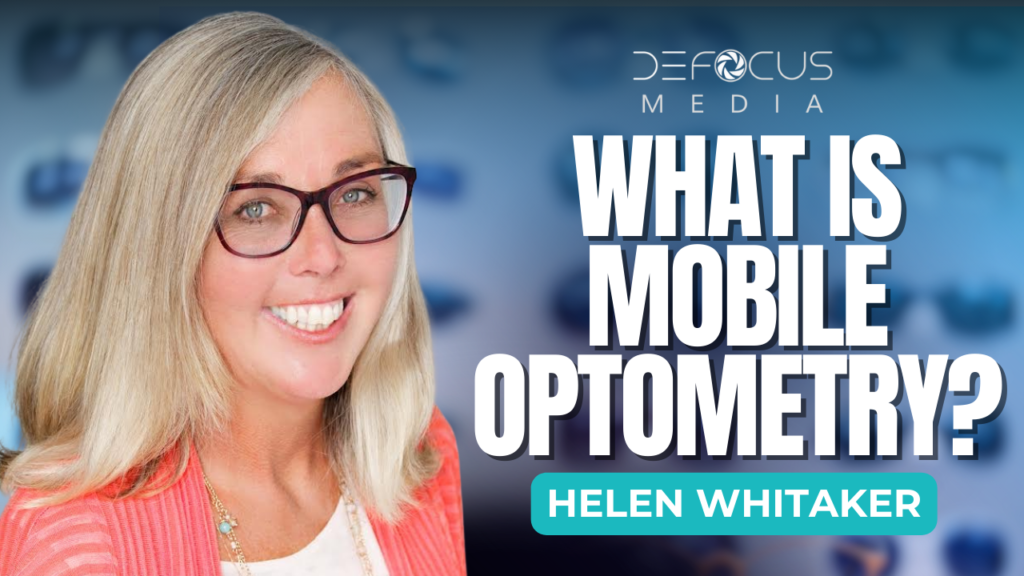Podcast: Play in new window | Download
Subscribe: Apple Podcasts | Spotify | Amazon Music | Android | RSS
In this captivating episode of Defocus Media, we spotlight Helen Whitaker, a visionary entrepreneur reshaping the landscape of eye care through her innovative business model in mobile optometry. With a rich background spanning the UK to East Africa, and a seasoned career in medical sales across Europe, Helen’s journey is one of resilience, transformation, and passion. Upon relocating to Canada as a single mother, she carved a new path for herself and her family by venturing into optometry, ultimately pioneering a mobile optometry business that delivers personalized, high-quality eye care services directly to patients’ environments. This episode delves into how Helen’s unique approach caters to the unmet needs of diverse communities and embodies a profound commitment to accessibility, convenience, and the deep-seated relationships between optometrists and their clients. Join us as Helen Whitaker shares her inspiring story, from her early beginnings to creating a business model she deeply adores, offering insights that promise to enlighten and inspire current and aspiring optometrists.

What is Covered in Mobile Optometry:
Introduction to Mobile Optometry and Helen Whitaker’s Journey
Dr. Darryl Glover:
Today, we’re diving into mobile optometry, and we’re fortunate to have Helen Whitaker with us. Helen is a trailblazer in the field—a winner, mentor, and mobile optician. This episode promises to be enlightening as we explore everything there is to know about mobile optometry. Welcome, Helen, to this Defocus Media production. Could you start things by sharing a bit about your background, where you’re from, and perhaps a fun fact about yourself? Let’s get this conversation started.
Helen Whitaker:
Thank you, Dr. Glover. It’s a pleasure to be here. I’m originally from the UK, but as we Brits love to talk about ourselves, feel free to hit the off button whenever you’ve had enough! I was born in the UK but raised in East Africa, in Nairobi, to be precise. A significant part of my heart remains there, which I hope we can delve into later. My journey followed the conventional path of school, college, and university. Afterward, I embarked on a career in medical sales, spending over 22 years working across the UK and Europe. I served as an account manager and group sales manager for major ophthalmic companies like Alcon and Ciba—some might remember the latter, which was quite prominent back in the day. My introduction to ophthalmology involved working closely with cataract surgeons on procedural packs and intraocular lenses—a job that, despite initially terrifying me, allowed me to be embraced by the community with grace and compassion.
In 2007, I moved to Canada as a single mother with two young daughters, aged seven and eight. It was a period of reinvention for me; I sought a career that wouldn’t take me away from my home and children, something that allowed me to settle into and appreciate the country I had come to love. That’s when I decided to become an optician, a journey that took a couple of years and offered me incredible opportunities for growth. I trained as an optician, contact lens fitter, and refractionist, benefiting greatly from the unique opportunities available in British Columbia. Today, I’m proud to run a business model I deeply adore, one that I’m eager to share and teach others to replicate.
The Essence of Mobile Optometry Explained
Dr. Darryl Glover:
Helen, your story is truly inspiring. Before we dive deeper, could you give us a high-level overview of what mobile optometry entails?
Helen Whitaker:
Certainly, and please, don’t hesitate to jump in at any point. My passion might just carry me away. The genesis of my journey into mobile optometry was recognizing a distinct need and opportunity within the market. This realization was not solely from a business standpoint, though that played a significant role, but also from understanding the deep connections formed between optical professionals and their clients. These relationships are built on trust, need, and the unparalleled level of service we provide, which is why clients specifically request their trusted professionals by name, be it Dr. Glover, Dr. Tia, or any other. It’s about being the chosen provider for our ‘perfect clients,’ a term I use deliberately.
For me, identifying my perfect clients meant focusing on a specific group of people who resonated with my unique qualities and knew that I was fully committed to their welfare. Every consultation was an opportunity to find a solution tailored to their needs, whether that involved styling, vision correction, or collaborating with optometric colleagues to fulfill a prescription. My priority was always the client, not the corporation.
This realization led me to develop a business model prioritizing delivering exceptional service to those I enjoy working with. It’s about recognizing those moments and clients that genuinely make your heart sing, knowing that you’ve made a significant impact on their day, and feeling valued and fulfilled in your profession. This approach allowed me to refine my services to cater exclusively to my perfect clients.
Defining the ‘Perfect Client’ in Optometry
Dr. Darryl Glover:
Reflecting on your mention of the ‘perfect client’ or ‘perfect patient,’ how did you define this concept so clearly?
Helen Whitaker:
Absolutely, and that sense of accomplishment and expertise we all feel when we know we’ve truly made a difference in someone’s life is irreplaceable. It’s not about boosting our egos but about our profound impact on our clients by providing them with a moment of pure satisfaction. It’s about making them feel valued, understood, and cared for, even when facing challenges like macular degeneration, presbyopia, or other low vision issues. We offer them not just solutions but hope and reassurance.
Identifying your perfect client involves recognizing those who appreciate your expertise and resonate with your approach and personality. For me, that perfect client avatar emerged as women over 50, typically progressive lens wearers, often accompanied by their husbands or partners. They are the decision-makers, the ones who guide their partners in their choices, including healthcare decisions. This realization shifted my focus slightly from seniors—whom I deeply respect and enjoy working with—to also embracing this demographic as a core part of my clientele and referral network.
Tailoring Optometry Services to Meet Client Needs
Helen Whitaker:
Crafting a service tailored to your perfect client means understanding and meeting their needs precisely as they define them. For example, busy healthcare professionals, such as nurses, doctors, and surgeons, who work long hours, greatly appreciate the convenience of mobile optometry services. They value having an optometrist and optician come directly to their workplace, eliminating the need to take time off for appointments. This approach not only meets their needs but also opens up a vast array of opportunities for specialized care delivery, whether it’s in assisted living facilities, among indigenous communities in remote areas, or within corporate settings.
For those interested in exploring mobile optometry but unsure where to start, the key is to identify your target demographic—the group that not only needs your services the most but also aligns with your passion and expertise. Consider what specific problems you can solve for them and how you can make their lives easier. Then, tailor your services, marketing strategies, and delivery methods to meet these needs. Engage with communities, build partnerships, and leverage word-of-mouth referrals to establish a strong client base. Remember, success in mobile optometry isn’t just about filling a gap in the market; it’s about creating meaningful connections and providing exceptional care wherever it’s needed most.
Mythbusting Mobile Optometry: Beyond the Vehicle
Helen Whitaker:
Dispelling a common myth, mobile optometry doesn’t necessarily require a vehicle or a mobile unit to deliver services. The essence of mobile optometry lies in meeting the patients where they are, in their own environments, rather than expecting them to come to us. This approach requires adaptability and a willingness to tailor our services to our client’s specific needs and preferences, whether in a surgical team environment, an assisted living facility, or a corporate office.
The strategy involves forming collaborative partnerships with mobile optometrists, who can bring their expertise and equipment directly to the client’s location. This collaboration isn’t about competition or taking patients from one another; it’s about creating a mutually beneficial relationship that ultimately serves the patient’s best interests. By working together, we can provide comprehensive care, from eye exams to frame selection, in a convenient and efficient manner, ensuring that patients receive the best possible service.
Regarding the financial aspects of such partnerships, the arrangements are as unique as the engagements. The division of financial benefits, whether for framing, lenses, or professional services, depends on the agreement made between the optometrist and the optician, always with the patient’s needs and preferences at the forefront.
For instance, in communities with specific needs or preferences, such as Canada’s indigenous populations, there’s a significant opportunity to provide respectful, community-based care. By offering services directly within these communities, we can address long-standing service gaps and build trust, removing barriers to care such as stigma, racism, or logistical challenges. This approach not only fosters a positive professional relationship with community leaders but also resonates across provinces and nations, amplifying the impact of our services.
Another example is servicing remote or underserved areas, such as Powell River on Canada’s West Coast, where access to comprehensive eye care is limited. In such cases, the negotiation focuses on how to make these services accessible, whether through direct engagement or logistical arrangements, ensuring that the community’s eye care needs are met in a manner that respects their unique circumstances and preferences.


